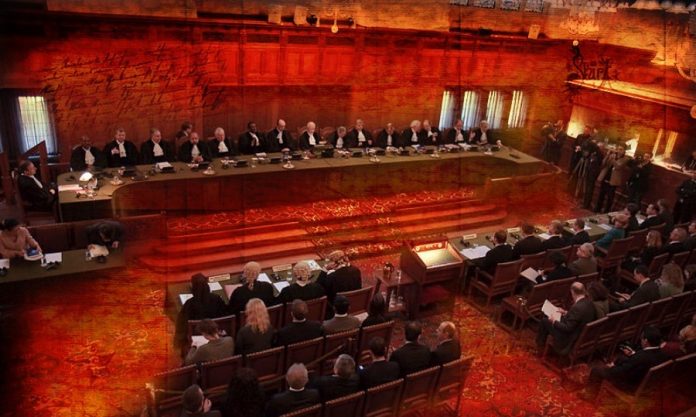This article is written by Jisha Garg, a student currently pursuing B.A.LLB (Hons.) from Rajiv Gandhi National University of Law, Punjab. This is an exhaustive article dealing with the increased use of economic sanctions as a ‘force’ against other countries without getting involved in an armed attack. The article highlights that economic sanctions are acts of aggression and violative of human rights. It also underlines the adverse impact of such sanctions on the underdeveloped countries and how the decision for imposing such sanctions need to be carefully scrutinized.
Table of Contents
Introduction
The end of the Cold war indicated a revolutionary shift in the means of international conflict. The 1990s saw the formerly impotent and stalemated Security Council rise to power, wielding the weapons of trade rather than the traditional methods of destruction. Imposing sanctions against various nations are based on the assumption that restrictions on trading power are less destructive and more humane than a full-blown armed attack.
The United Nations has imposed unilateral sanctions 40 times during 1945-1990. Since 1990, the number of multilateral sanctions has been increasing drastically. Imposing sanctions by the Security Council is seen as a routine exercise in case of violations in international law and is considered as a preferred path as opposed to the ‘use of force’. Economic sanctions can have devastating effects on the economy of the target nation in turn adversely affecting the economic and political situation of a developing state. The effects of imposing sanctions are very similar to that of the ‘use of force’- hunger, death, and disease. It is therefore that the time has arrived that the relationship between economic sanctions and the use of force be re-examined and re-established.
This article argues that, given the similar effects of economic sanctions and the use of force on various nations, the time has come to scrutinize the decision to impose economic sanctions with the same amount of caution used to scrutinize the decision to use force. It also stresses on the fact that the Security Council violates the UN Charter when it fails to establish the grounds of imposing sanctions and to establish the duration of such sanctions. It also examines the adverse repercussions economic sanctions have on the targeted nation and enquires when the act of imposing sanctions transforms into an act of use of force.
What are ‘economic sanctions’?
Economic sanctions are defined as the withdrawal of customary trade and financial relations for foreign and security policy purposes. Sanctions could be imposed for prohibiting commercial activity either against the entire nation-states or against particular individuals or groups. Sanctions can take a variety of forms including arms embargoes, foreign aid reductions, travel bans, capital restraints, asset freezes, and trade restrictions. Economic sanctions are imposed by governments and multinational bodies in order to alter the strategic decisions of the state by interfering in their internal matters. The critics contend that they have proved ineffective in changing the conduct of the nation-state whereas the supporters claim that economic sanctions have proved to be an important international policy tool.
Sanctions can be multilateral, with many countries acting together, mostly under the auspices of the United Nations or Unilateral when one country takes action on its own. However, when the country imposing sanctions is acting unilaterally, the costs can be large. Also, the violations of the sanctions imposed unilaterally have proven to be less effective. On the other hand, if the economic sanctions are imposed multilaterally with the involvement of the international community, there are fewer chances of violations due to the fear of actions taken against the targeted nation.
Principle of non-intervention in economic sanctions
- The principle of non-intervention is defined by the International Court of Justice in Nicaragua v. United States as a principle prohibiting all states from directly or indirectly intervening in the internal or external affairs of other states.
- The non-intervention principle does not find a mention in the UN Charter but the Nicaragua case held that it is not essential that the Charter contains every principle of international customary law. The court also held that politically justifiable decisions cannot be considered as legally justifiable.
- States are free to decide on their internal as well as external decisions and any armed conflict to coerce the states to make such binding decisions is not permissible under International Law.
- The Nicaragua case also held that the intervention may not only be restricted to an armed attack or military action but also includes other forms of indirect attacks that endanger the sovereignty of the nation-state and coerce them to take decisions.
- Even in case of interventions due to the humanitarian crisis, there are certain restrictions that are imposed on the intervening states that need to be followed.
Economic sanctions violative of International Human Rights Law
- The Universal Declaration of Human Rights was adopted by the UN General Assembly in 1948 with a view that the preservation of economic and social rights for all was necessary for the preservation of freedom, democracy, and peace. Therefore, it was necessary to take action against the imposition of unjust economic sanctions.
- The principles of UDHR were codified in two sources of international law. The covenants codified under UDHR guarantee a right to an adequate standard of living, including the right to adequate housing, adequate food and nutrition, and the “necessary conditions of care”. Citizens are free to determine their political choices in order to ensure their economic and social development. The covenant imposes an obligation on the various nation-states to avoid hunger, starvation and suffering on the people of their state. It is their primary duty to ensure an adequate standard of living and the freedom to make choices freely to the nation’s population.
- Although the Security Council is not a signatory to UDHR it has been argued that it is bound to accept the provisions of UDHR. In order to give effect to the provisions of UDHR, it is essential that the Security Council does not take away the citizen’s rights for adequate housing and adequate means of survival including proper food. This is because inadequate means of survival can be the unintended effects of armed conflict but even if the effects are unintended, starving the citizens is impermissible. The Security Council is vested with the power to mitigate the effects of starvation during such armed conflicts. And if starvation could be the result of unjust economic sanctions, it is bound to prevent such sanctions under the principles of UDHR.
- It is crucial to determine the effects of the sanctions on the civilians of the nations concerned while imposing sanctions because the effects of the economic sanctions are more devastating for the civilians than on the regime who is originally the actual cause of the economic sanctions. Therefore, it is important for the Security Council to take into account the responses of the respective regimes to the economic sanctions before imposing them.
Economic sanctions as a use of force
Article 39 of Chapter VII of the U.N. Charter gives the Security Council the power to “determine the existence of any threat to the peace, breach of the peace, or act of aggression. If the Security Council is of the view that such a threat exists, then it is granted the power to impose economic sanctions on the respective state in order to maintain peace and order in society. However, if the nation-state does not comply with these sanctions, the council is empowered to use force against the nation-state. Imposing economic sanctions is usually the first step followed by the use of force.
However, it is misleading to assume that imposing economic sanctions is less devastating than the use of force. Once the armed conflict comes to an end, it takes little time for the nations to recover whereas, in the case of economic sanctions, it denigrates the chances of recovery for the nation-state since it has a long term impact on the economy of the country. Various nations impose trade barriers on the concerned nation-state because of prohibition orders from the Security Council. Although the state has good trade relations with the other state, the state is deterred from trading due to impositions of economic sanctions. This can prove to be more catastrophic than armed conflict.
The scope of the ‘use of force’ can be determined by looking at various precedents such as the Nicaragua v. United States case. In this case, the International Court of Justice held that while financial and material assistance to rebels had not constituted an “armed attack”, “such assistance may be regarded as a threat or use of force, or amount to intervention…” However, the court has failed to demarcate a line between the “use of force” and an “armed attack” and specify which actions would be regarded as a use of force. Although, on the face of it, economic sanctions cannot be regarded as a use of force, when analyzed from an effect-based approach, economic sanctions can prove to be more than mere acts of international diplomacy.
Economic sanctions as an act of aggression
In 1950, the UN recognized a need to define aggression. The general assembly finally adopted the definition by a resolution passed in 1974. According to this resolution, an “act of aggression” would include the use of force. However, keeping in view the current technological advancements and the emergence of biological warfare, this definition seems to be too narrow in scope. Going by the current legal definition of an “act of aggression”, certain intervening acts of various states having adverse impacts on the political and economic stability of the state would be overlooked.
Certain acts such as information warfare may not be legally considered acts of aggression but when analyzed from the viewpoint of the adverse impact that it has on the economy and military operations of the nation-state, one is certainly forced into re-examining the legal framework of “acts of aggression”. There is an urgent need to widen the scope of “acts of aggression” so that the acts which indirectly endanger the sovereignty of a nation-state are made liable for such acts.
Conclusion
Economic sanctions have often proven to be ineffective and have caused more harm to the civilian population than political gains. Although economic sanctions have proven to have more devastating effects than the use of force, the decisions to impose economic sanctions are not carefully scrutinized. The imposition of long term sanctions has proven to be catastrophic especially to the economies of the developing nations.
Although the sanctions approved by the Security Council are legally enforceable, yet it violates its own charter and the Universal human rights law when it fails to determine the extent and duration of the economic sanctions. In order to comply with International Law, it is important that the SC formulate such laws and guidelines which would be helpful in imposing, monitoring, and lifting the sanctions. Proper safeguards should be provided to prevent impermissible sanctions and to avoid political gains out of such situations. Also, the participation of the nation-state concerned in the entire can help build trust and would prevent violations of the sanctions. All the processes should be subject to judicial review in order to promote transparency.
Economic sanctions are powerful weapons in the hands of the international community which when used fairly can lead to positive changes in society without the use of arms and ammunition. However, economic sanctions must be used with utmost caution since it has led to destructions in the economy of various nation-states in the past. They have been responsible for causing havoc in the lives of the civilian population with the governments turning a blind eye to their situations. With proper reform, sanctions can be a more precise tool, better engineered, and more skilfully applied to bring more healing than pain.
References
LawSikho has created a telegram group for exchanging legal knowledge, referrals and various opportunities. You can click on this link and join:
 Serato DJ Crack 2025Serato DJ PRO Crack
Serato DJ Crack 2025Serato DJ PRO Crack











 Allow notifications
Allow notifications


